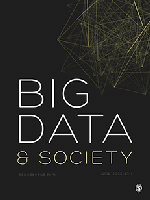The Chilling Effects of Digital Dataveillance: A Theoretical Model and an Empirical Research Agenda
2022
Büchi, Moritz /
Noemi Festic /
Michael Latzer
Big Data & Society, 9(1). https://doi.org/10.1177/20539517211065368
 |
People's sense of being subject to digital dataveillance can cause them to restrict their digital communication behavior. Such a chilling effect is essentially a form of self-censorship in everyday digital media use with the attendant risks of undermining individual autonomy and well-being. This article combines the existing theoretical and limited empirical work on surveillance and chilling effects across fields with an analysis of novel data toward a research agenda. The institutional practice of dataveillance—the automated, continuous, and unspecific collection, retention, and analysis of digital traces—affects individual behavior. A mechanism-based causal model based on the theory of planned behavior is proposed for the micro level: An individual's increased sense of dataveillance causes their subjective probability assigned to negative outcomes of digital communication behavior to increase and attitudes toward this communication to become less favorable, ultimately decreasing the intention to engage in it. In aggregate and triggered through successive salience shocks such as data scandals, dataveillance is accordingly hypothesized to lower the baseline of free digital communication in a society through the chilling effects mechanism. From the developed theoretical model, a set of methodological consequences and questions for future studies are derived. |
